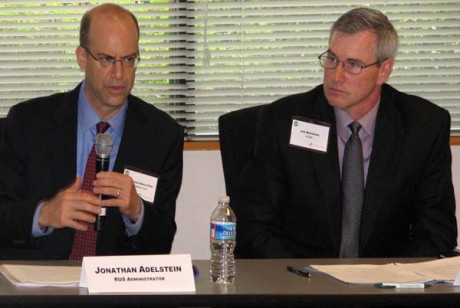White House Roundtable
Discussion focuses on growing rural America’s economy
By Michael E.C. Gery
North Carolina's electric cooperatives in June hosted a discussion on the partnership between the U.S. Rural Utilities Service (RUS) and the businesses and agencies guiding North Carolina's economic development. RUS administrator Jonathan Adelstein said the meeting was "one of the most impressive I have seen" in a series of such meetings. He said the Obama Administration initiated the White House Roundtable on Business & Infrastructure series to "hear from the business community about what we can do to help grow the economy and rural America."
RUS, an agency within the U.S. Department of Agriculture, is the successor to the Rural Electrification Administration (REA) that was instrumental in helping electric cooperatives form and bring power to rural communities in the 1930s and 1940s. Today, RUS administers USDA's Rural Development Utilities Program that manages more than $165 billion in loans and loan guarantees that are at work to improve the economic stability of rural communities, businesses, residents, farmers and ranchers and improve the quality of life in rural areas. Electric cooperatives have long been a prime mover in bringing these programs to their service areas.
Besides Adelstein and electric cooperative leaders, those attending the White House Roundtable included representatives from the N.C. Chamber of Commerce, Department of Commerce, Rural Economic Development Center, Institute for Minority Economic Development, Golden Leaf Foundation, Farm Bureau, community colleges, telephone cooperatives and various businesses.
Much of the discussion focused on developing and maintaining infrastructure that can attract and keep businesses and create jobs. Elements include water and sewer systems, broadband communication, business parks and agriculture and energy-related services. Adelstein and Randall Gore, USDA's rural development director for North Carolina, praised the state's work in advancing broadband, telemedicine and distance learning services for rural communities. In early June, USDA funded more than $500,000 in grants for such services based at the health center on Ocracoke and Vidant health centers based in Chowan, Duplin, Edgecombe, Hertford and Pitt counties.
USDA Rural Development has seven area offices and 14 field offices across the state. Area office locations are in Asheville, Shelby, Lumberton, Asheboro, Henderson, Kinston and Smithfield. Further information on rural programs is available at a local USDA Rural Development office or by visiting the USDA Rural Development website at www.rurdev.usda.gov.
-
Share this story:


